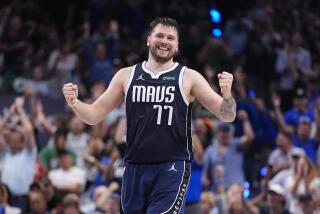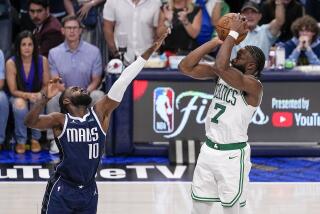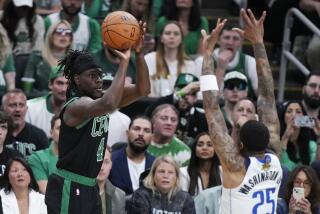Dirk Nowitzki and LeBron James provide the intrigue in Dallas-Miami series
- Share via
Starting guards: So much of the focus will be on Miami’s Dwyane Wade and Dallas’ Jason Kidd, but the ability of Heat point guard Mike Bibby to make three-point shots and the Mavericks’ DeShawn Stevenson to make his shots and defend Wade will play pivotal roles in the series. All eyes will be on Wade and Kidd. Wade is one of the best shooting guards in the NBA and he’s great on both ends of the floor. He has averaged 23.7 points, 7.2 rebounds, 4.1 assists, 1.67 steals and 1.27 blocked shots in the playoffs. Kidd, at 38, remains one of the top floor generals in the game. He is averaging 7.7 assists per game in the playoffs, and he has shot 35.6% from three-point range, making him a threat for the Mavericks.
Advantage: Heat (Wade is that good).
Starting forwards: Let’s face it, this is the most intriguing matchup because of the brilliant and unreal offensive domination by Dallas’ Dirk Nowitzki and the all-around and phenomenal play by Miami’s LeBron James. But make no mistake, the play of the Heat’s Chris Bosh in the playoffs has given Miami its Big Three and not the Big Two-and-a-half from the regular season. Bosh will have his hands full trying to defend the 7-foot Nowitzki, who has averaged 28.4 points in the playoffs and shot 51.5% from three-point range. Mavericks small forward Shawn Marion has improved his play in the postseason, but he’ll have his hands full with James, who has averaged 26 points, 8.9 rebounds, 5.5 assists, 1.67 steals and 1.47 blocked shots in the postseason.
Advantage: Heat (But this/close).
Starting centers: Dallas’ Tyson Chandler and Miami’s Joel Anthony both are defense-oriented players — although Chandler has provided the Mavericks with some offense because of his ability to catch lob passes and turn them into dunks. Chandler probably will spend a lot of time defending Bosh so that Nowitzki doesn’t get into foul trouble and doesn’t wear himself out on both ends of the court. Anthony is averaging 2.07 blocks per game in the playoffs. He’ll probably see some time on Nowitzki as well.
Advantage: Dallas.
Benches: At one time during these playoffs, it was clear that Dallas’ bench was far superior to Miami’s. But the Heat has closed that gap with the improved play of its reserves during the Eastern Conference finals. Dallas brings in a lot of firepower off the bench, starting with Jason Terry, who is second on the team in scoring (17.3) in the playoffs. Jose Barea (9.5 points) and Peja Stojakovic (8.8 points, 39.7% three-point shooting) knock down shots and backup center Brendan Haywood is an anchor on defense. Power forward Udonis Haslem has given the Heat a big lift with his hustle, defense, rebounding and determination, things that don’t always show up in the stat sheet. Mike Miller started making his shots, giving the Heat another offensive weapon; he also has rebounded the ball well in the playoffs. Mario Chalmers remains inconsistent, but when he’s on his game, he gives the Heat another lift.
Advantage: Dallas, just not as big as it once was.
Coaching: Dallas’ Rick Carlisle has shown that he has a great basketball mind and keeps his team prepared. He is cool under fire and has made the necessary adjustments in between games. Miami’s Eric Spoelstra has made it through a difficult season, but it has become clear that he has a better grip on his team and how he should run the team. Don’t underestimate the power of Pat Riley and his motivating ways when he shows up at a Miami practice or sends a text or note to one of his players.
Advantage: Dallas, but very close.
Offense: The Mavericks run some of the best pick-and-rolls and pick-and-pops in the game. They run much of their offense through Nowitzki, putting him in places where he can operate or find open teammates. Kidd is the quarterback, always looking for seams in the defense and ways to set up his teammates. When the Heat doesn’t stand around and play isolation basketball with Wade or James, it is good, especially when it gets out in transition. Dallas has scored 99.67 points per game in the playoffs, the Heat 92.93. Dallas has shot 46.3% from the field, 38.8% from three-point range. Miami has shot 44.3% from the field, 32.2% from three-point range.
Advantage: Dallas.
Defense/rebounding: Miami players are great at helping each other on defense and forcing the biggest offensive threat on a team to tough spots on the floor. The Heat is allowing 88.27 points a game in the playoffs, third-best in the league. Dallas will mix in some zone with its man-to-man defense. The Mavericks have allowed 92.53 points per game, fifth-best in the postseason. Keeping teams off the offensive boards has been an issue at times for the Heat and Mavericks.
Advantage: Heat.
Turner’s pick: Miami Heat in six entertaining games.
twitter.com/BA_Turner
More to Read
Go beyond the scoreboard
Get the latest on L.A.'s teams in the daily Sports Report newsletter.
You may occasionally receive promotional content from the Los Angeles Times.











